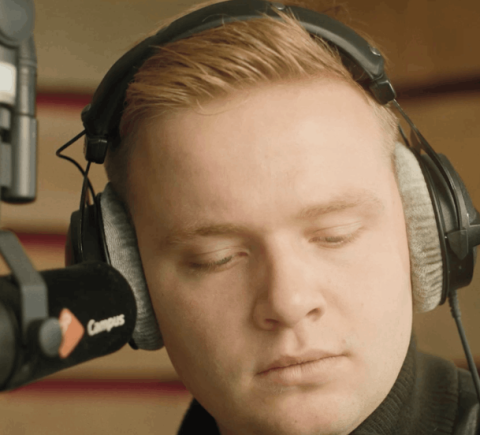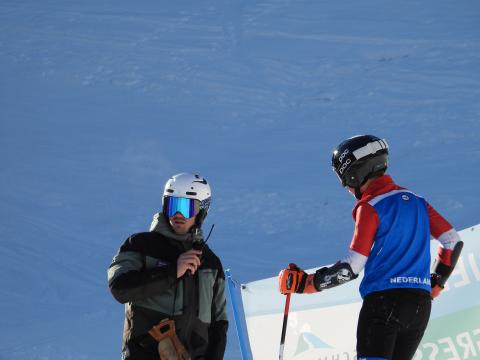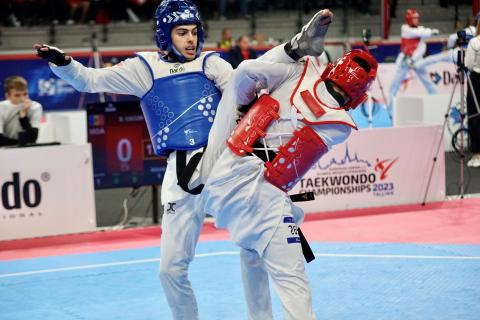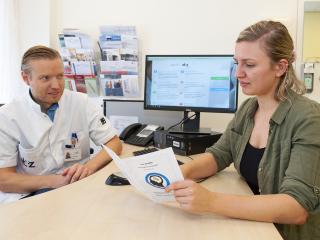Masters in multitasking: students with a dual career combine their studies with their passion
Combining a degree program with, for instance, a career as an elite athlete or as an entrepreneur is quite a challenge. Dual Career Officers Ferenc Jongejan and Daan Faassen try to support these students in the best possible way to help them combine those two careers. Students with a dual career tell about the lessons learnt and about how they cope with setbacks.
“Dual Career Officers are the first point of contact within the university as regards dual careers and they coordinate matters concerning students with dual careers within the university,” Ferenc explains. “As Dual Career Officers, we have an advisory role towards the Schools and the programs. With their education coordinator, students discuss their program schedule, any clashes that they anticipate, and possible solutions. The support offered is tailored to the student. I talk to some students only twice a year, but others I see every week.”
Tailored program
“The question students most frequently ask me is whether their program can be made flexible because the flexibility in their other career is usually very limited. If an artist has to choose between going to a class or doing a performance, the choice is obvious. That performance may bring the artist a step closer to the goal of being successful in the musical industry. The same goes for a team sport. An athlete cannot easily say to their team: ‘I can’t come to training. I have to a class to attend.’”
It is mainly the compulsory lectures, group assignments, and partial results that pose challenges for students with a dual career. “We consult with instructors to find out what alternative options are available. Students themselves have this conversation with their instructors first. We expect this level of independence and responsibility at this university. We do support them as Dual Career Officers wherever necessary. Across the board, instructors and Schools are very willing to collaborate and be flexible.”
Developing personal competencies
“The group of students we help is endlessly divers, but they have a few things in common: they are ambitious, they adopt a process-oriented approach, they are good at communicating and planning, and they are result-oriented. These competencies are essential for fostering their talents. If you want to reach the top in any field, these competencies will be valuable.”
Tilburg University supports students with a dual career
Tilburg University is proud of its students with a dual career. Combining a degree program with a high-performance sports career, an enterprise, or a career in the performing arts, for instance, is a big challenge. The university therefore tries to support this group of students in the best possible way to enable them to combine their two careers.
For instance, Tilburg University offers extra supervision, flexible options in programs, and possibilities for financial compensation, among other things, for any study delay incurred by dual career students. Talent status is necessary to be eligible for these facilities.
On the university website, you can find an up-to-date overview of the facilities available for dual career students.
Sebastiaan Ockhuysen, student of Communication & Information Sciences and radio DJ

You have to think of the dream you have and the underlying plan as an ambition, not as the determining factor
Making choices
“The most important lesson learnt while balancing studies and career is that I need not be afraid to prioritize by career when it is necessary to do so. For my work, I often need to substitute for someone at the last minute, which sometimes clashes with an academic deadline. If the substitute job is too good an opportunity to pass up, sometimes it is better to go for the resit, or find a different solution with instructors and other stakeholders. It is crucial in such cases to be clear about what opportunities in your career are valuable enough to make those choices.”
Continuing to grow
“I want to continue to grow in my career, but I also have a clear picture in my mind about how and when I want to graduate. Sometimes your career is slow or you do not obtain enough credits. For me, it is important to learn to be flexible. You have to think of the dream you have and the underlying plan as an ambition, not as the determining factor.”
Thomas Hemelaar, Strategic Management student and sports coach at the Netherlands Ski Federation

I have always looked at the bigger picture and accepted that sometimes things don’t go the way I had thought them out in my head
Accept what you cannot change
“The most important lesson learnt while balancing studies and career is that I sometimes have to accept that I cannot do everything, even if I wanted to. In November, I was away for five weeks, providing training and coaching games. Unfortunately, the lectures in my program are not recorded, so I missed five of the seven lectures. That resulted in study delay. In addition, it is important to sometimes turn the switch and create an environment where you can concentrate on your studies.”
Remaining flexible
“I have always looked at the bigger picture and accepted that sometimes things don’t go the way I had thought them out in my head. What has personally taught me most is that, as a trainer/coach, you always have to have a plan B as well as a plan A and that you have to remain flexible and adjust your plan. Not only as a sports coach on the slopes, but also at university.”
Isabel Provoost, Law student and singer

I have learnt to listen to myself and to take the time to do so
Asking for help
“An important lesson I learnt is that I can ask for help if I can't figure things out myself. Gearing the courses I'm going to take to releasing new music and the shows that are part of a new release is sometimes difficult. It means I have to plan ahead and stick to my schedule. The university has helped me a lot in this. In consultation with the education coordinator, I have opted to spend an extra year studying, so that I could properly focus on my courses and simultaneously continue to make music and do shows. This has enabled me to pursue both my passions: my studies and my musical career.”
Setting boundaries
“At first, I found it difficult to choose to take another year to graduate. I thought I would be able to manage it all and that delay could be avoided. Eventually it turned out that combining a full-time study program and making music was not feasible. I am a perfectionist by nature and I want to get everything right the first time. Opting to take an extra year to graduate has taught me to set boundaries. I have learnt to listen to myself and to take the time to do so.”
Aymen Achnine, Law student and taekwondoka

Coping with setbacks has resulted in personal growth, in my sports and academic careers
Separating what matters from what doesn't
“It was often a big challenge to combine elite sports and my studies. Over the years, I have learned to prioritize better but, most importantly, to separate what matters from what doesn’t in my studies. My aim is to pass my courses and to achieve the highest possible performance in my sport. I make sure to focus primarily on the most important thing. As a result, I score well in exams, but I need to spend less time studying, allowing more time for high-performance sport.”
Coping with setbacks while pursuing a dual career
“High-performance sport means you lose more often than you win. I have also lost a lot in the course of my sports career, which it tough mentally. On the other hand, it has also done me a world of good in my personal development: perseverance, reflective and problem-solving skills, as well as working in a process-oriented way are competencies that I have improved a great deal. This has resulted in personal growth, in my sports and academic careers.”
Support top athletes during their studies
With your donation, you are investing in talent development. Even with a limited budget, a top student athlete can effectively combine study and sport.
- Together, we make a difference
- Support talented students during their studies
- Ensure they don't have to choose between a part-time job or training camp alongside their studies
Also in Tilburg University Magazine
Date of publication: 30 April 2024



